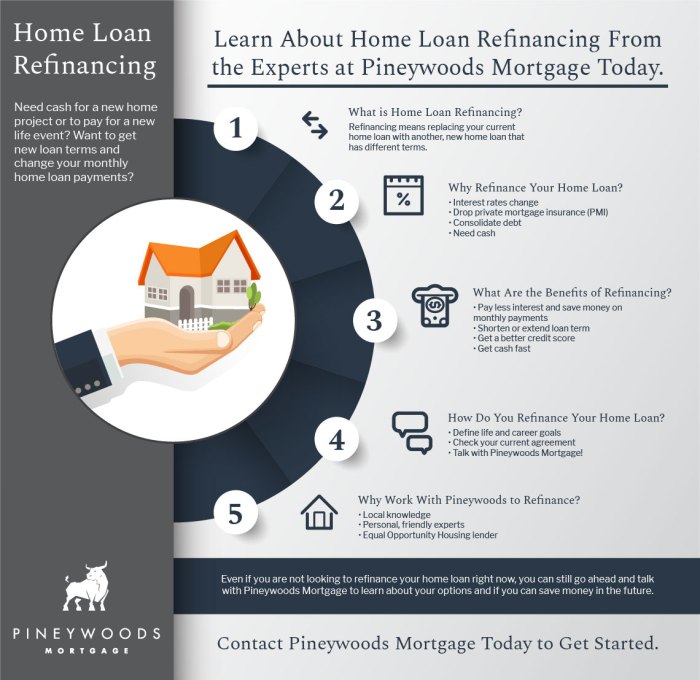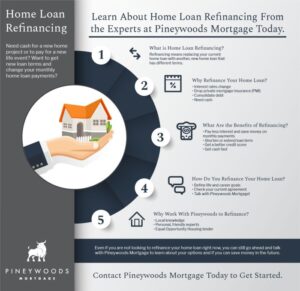
Home financing and mortgage tips are essential tools for anyone looking to navigate the complex world of real estate. Understanding your options can help you make informed decisions that suit your financial situation and long-term goals. With the right guidance, you can demystify the process and find the best strategies for securing your dream home.
From improving your credit score to collaborating with professionals in the industry, this guide will cover everything you need to know about home financing. Whether you’re a first-time buyer or a seasoned investor, these tips will empower you to take control of your home-buying journey.
Home Financing Basics

Understanding home financing is essential for potential buyers navigating the path to homeownership. With various options available, it’s crucial to grasp these fundamentals to make informed decisions that align with financial goals.Different types of home financing options cater to diverse buyer needs, ranging from traditional loans to specialized programs. Familiarizing yourself with these can help tailor your search for the right mortgage, ensuring you find the best fit for your financial situation.
Types of Home Financing Options
There are several common types of home financing options that buyers should consider:
- Conventional Loans: These are standard loans not insured by the government, typically requiring a higher credit score and a down payment of around 20%.
- FHA Loans: Offered by the Federal Housing Administration, these loans allow for lower credit scores and down payments as low as 3.5%, making them ideal for first-time buyers.
- VA Loans: Available to veterans and active-duty service members, these loans often require no down payment and do not require private mortgage insurance (PMI).
- USDA Loans: Designed for rural homebuyers, these loans promote homeownership in less populated areas and may require no down payment.
- Jumbo Loans: For properties that exceed the conforming loan limits, jumbo loans are typically used for higher-priced homes and come with stricter credit requirements.
Improving Credit Scores Before Applying for a Mortgage
A strong credit score can significantly impact your mortgage options and interest rates. Improving your credit score before applying is beneficial and often necessary for securing favorable terms.To boost your credit score, consider the following strategies:
- Review Your Credit Report: Ensure all information is accurate and dispute any errors that may negatively affect your score.
- Pay Down Debt: Reducing outstanding debts can lower your credit utilization ratio, positively influencing your score.
- Make Payments on Time: Timely payments on all bills consistently contribute to a higher credit score.
- Avoid New Credit Inquiries: Limit the number of new credit applications in the months leading up to your mortgage application.
- Keep Old Accounts Open: The length of credit history plays a role in your score; keeping older accounts active can help.
Understanding Mortgage Terms and Conditions
Being well-informed about mortgage terms is vital for making sound financial decisions. Buyers should pay close attention to the following key aspects:
The interest rate, loan term, and type of mortgage can significantly affect the total cost of home financing.
When reviewing mortgage documents, focus on these crucial elements:
- Interest Rate: This can be fixed or adjustable; understanding the implications of each is essential for budgeting.
- Loan Term: Mortgages can have various lengths, typically 15 or 30 years, impacting monthly payments and total interest paid over time.
- Closing Costs: Comprising various fees, these can add up and should be clearly Artikeld in the loan estimate.
- Private Mortgage Insurance (PMI): Required for down payments less than 20%, knowing when this applies can affect overall costs.
- Prepayment Penalty: Some loans may charge fees for paying off the mortgage early; understanding this can affect future financial planning.
Working with Real Estate Professionals
Navigating the home buying process can be overwhelming, especially when it comes to understanding the myriad of professionals involved. Real estate agents and mortgage brokers play pivotal roles in ensuring a smooth experience. Their expertise not only helps buyers find the right property but also secures optimal financing options tailored to individual needs.Real estate agents and realtors serve as guides in the home buying journey.
They possess in-depth knowledge of the local market, which allows them to provide valuable insights on property values, neighborhoods, and current trends. They help you identify properties that fit your criteria and facilitate negotiations between buyers and sellers. Their experience can significantly streamline the process, making it easier to navigate paperwork and legalities.
Choosing a Real Estate Agent
Selecting the right real estate agent is crucial for a successful home buying experience. Not all agents are created equal, and finding one that aligns with your preferences and needs is essential. When looking for an agent, consider the following factors:
- Experience and Expertise: Seek agents who have a proven track record in your desired area. Their familiarity with local market conditions can provide a competitive advantage.
- Communication Style: Choose someone whose communication style resonates with you. Clear and open communication is vital for a smooth transaction.
- Client Reviews and Testimonials: Research reviews from past clients to gauge satisfaction levels. Personal recommendations from friends or family can also be helpful.
- Negotiation Skills: An effective agent can advocate for your best interests and negotiate favorable terms on your behalf.
The collaborative nature of the relationship you establish with your real estate agent can greatly influence the outcome of your home purchase.
Benefits of Collaborating with Mortgage Brokers
Mortgage brokers can be invaluable allies in the home financing process, offering a range of benefits that enhance your ability to secure favorable loan terms. They act as intermediaries between borrowers and lenders, helping you navigate the complex landscape of mortgage options. Working with a mortgage broker provides several advantages:
- Access to Multiple Lenders: Brokers have relationships with a variety of lenders, which means they can present you with numerous financing options that suit your financial profile.
- Expert Guidance: With their in-depth understanding of loan products, brokers can help you choose the best mortgage type, whether it be fixed-rate, adjustable-rate, or government-backed loans.
- Time-Saving: They streamline the application process, often handling paperwork and communication with lenders, allowing you to focus on other aspects of your home search.
- Negotiation Power: Brokers often have leverage to negotiate better terms or lower fees, which can save you money in the long run.
In summary, leveraging the expertise of real estate professionals, including agents and mortgage brokers, can significantly enhance your home buying experience, ensuring you make informed decisions that align with your goals. Their guidance will help you navigate through the complexities of purchasing a home, ultimately leading to a successful and satisfying outcome.
Navigating Different Real Estate Types

Understanding the various types of real estate is crucial for potential buyers, investors, or anyone involved in the property market. Each category presents unique advantages, challenges, and opportunities. This overview will dive into commercial versus residential real estate, explore the concept of green real estate, and compare investing in foreclosures against traditional homes.
Advantages of Buying Commercial Property Versus Residential Real Estate
Investing in commercial property can offer distinct benefits over residential real estate. Here are the key advantages:
- Higher Income Potential: Commercial properties often generate higher rental rates and longer lease terms compared to residential properties, leading to increased cash flow.
- Less Tenant Turnover: Businesses typically sign longer leases, which reduces the frequency of tenant turnover and the associated costs of finding new tenants.
- Property Value Growth: The value of commercial real estate can appreciate more significantly based on location, market demand, and property improvements, making it a lucrative investment.
- Tax Benefits: Owners of commercial properties can take advantage of various tax deductions, including depreciation and operational costs, which can optimize their investment returns.
Overview of Green Real Estate and Its Benefits for Buyers
Green real estate focuses on environmentally-friendly properties designed to minimize their ecological impact while promoting sustainable living. The benefits of investing in green real estate include:
- Energy Efficiency: Green buildings are built with energy-efficient materials and technologies, resulting in lower utility bills for homeowners.
- Healthier Living Environments: These properties often incorporate better indoor air quality and natural lighting, contributing to improved health and well-being.
- Increased Property Value: As demand for sustainable living grows, green properties may appreciate more rapidly than traditional homes, making them a smart investment.
- Government Incentives: Many local and national governments provide tax incentives, rebates, or grants for buyers of green real estate, making it financially attractive.
Comparison of Investing in Real Estate Foreclosures Versus Traditional Homes
Investing in foreclosures and traditional homes each comes with its own set of pros and cons. Understanding these can aid potential investors in making informed decisions.
- Lower Purchase Prices: Foreclosures are often sold below market value, providing opportunities for significant savings.
- Potential for High Returns: Investors can renovate foreclosed properties and sell them for a profit, capitalizing on the difference between purchase price and market value post-renovation.
- Increased Risk: Foreclosures may come with hidden damages or legal issues, which can lead to unexpected costs and complications.
- Less Competition: The foreclosure market may have fewer buyers compared to traditional homes, leading to more negotiation power for savvy investors.
Wrap-Up
In summary, mastering home financing and mortgage tips is crucial for making smart real estate decisions. By understanding your financing options, working with the right professionals, and knowing the nuances of various real estate types, you can pave the way for a successful investment. Remember, the more informed you are, the better equipped you’ll be to achieve your homeownership dreams.
User Queries
What are the main types of home financing options?
The main types of home financing options include conventional loans, FHA loans, VA loans, and USDA loans, each catering to different buyer needs.
How can I improve my credit score before applying?
You can improve your credit score by paying down debts, making timely payments, and avoiding new credit inquiries before applying for a mortgage.
Why should I work with a real estate agent?
A real estate agent can provide valuable insights, help you navigate the market, and negotiate on your behalf, making the buying process smoother.
What are the benefits of using a mortgage broker?
A mortgage broker can help you find better financing options, compare rates from multiple lenders, and save you time and effort during the application process.
What factors should I consider when choosing a real estate agent?
Consider their experience, local market knowledge, communication style, and whether they understand your specific needs and preferences.





